If you’re residing in Saudi Arabia, you must know the word “Iqama” and you might be having one.
But what if?
You’re planning to visit Saudi Arabia and heard the word called “Iqama”.
And looking for all the information from the person who’s living in Saudi Arabia from years and can guide you all the things you need to know about Expatriate Resident Card?
Don’t worry, I’ve been living in the Kingdom from quite sometime now and here I’m going to mention everything you need to know about Saudi Iqama.
Let’s move!
What is Saudi Iqama (Expatriates Resident ID)?

Well, let me get straight to tell you that Iqama is a residence permit for Expatriates/foreigners issued by the Saudi Arabian government.
It is a mandatory document for all expatriates in Saudi Arabia, and it must be renewed annually.
The Iqama card contains the expatriate’s personal information, such as their name, date of birth, nationality, and passport number.
It also includes information about their employer, such as the company name and address.
Without a valid Iqama, you can’t register anything such as Saudi National Address, Bank account opening, returning to your home country etc.
The Iqama card is a valuable document, and it should be kept safe and secure.
Loss or damage to the Iqama card can result in fines and other penalties.
Eligibility for Iqama
To be eligible for an Iqama, the expatriate must have a valid passport and a job offer from a Saudi Arabian company.
The employer will handle the Iqama application process on behalf of the expatriate.
Who will Issue Iqama and Responsible for Paying yearly fees?
Iqama will be issued from nearby Jawazat’s office and your sponsor/kafeel is responsible to provide you Iqama by bringing it from Jawazat.
He’s also responsible to issue Iqama within 90 days after you arrive in Kingdom of Saudi Arabia.
Also, he has to pay early renewal fees of Iqama as well as any fine if he’s late to renew as well as changing your Iqama Profession, according to Saudi Gazette.
So, from start to end your Sponsor/kafeel is responsible to provide any necessities regarding your residence permit called “Iqama”.
Iqama Renewal Requirements & Process
Let me give you an overview of what are the requirements you and your sponsor or company needs to meet when renewing Iqama.
- Pay the necessary fees.
- Work Permit (Responsibility: Your Sponsor)
- MOI (Responsibility: Your Sponsor)
- Dependent (If you have family on Iqama, you’re responsible to pay this fees, although it depends on your contract.)
- Unpaid fines must be paid. (Responsibility: You)
- There should be valid insurance policy. (Responsibility: Your Sponsor)
At last, If you have met all the requirements mentioned above, your employer can now renew your Iqama using Absher or Muqeem.
Iqama Renewal Fees Structure
While the responsibility for Iqama renewal does not fall on the expatriate, you might be wondering about its associated fees.
Let me provide you with an overview of the updated Iqama Renewal Fees structure for 2023.
You can pay these fees for a duration ranging from as low as 3 months to as long as 1 year.
Maktab Amal/Work Permit Fees
| Time Span | Fees |
|---|---|
| 3 Months | 2,400 Saudi Arabian Riyal |
| 6 Months | 4,800 Saudi Arabian Riyal |
| 9 Months | 7,200 Saudi Arabian Riyal |
| 12 Months | 9,600 Saudi Arabian Riyal |
MOI Fees for Issuing and Renewing Iqama
| Time Span | Fees |
|---|---|
| 3 Months | 163 Saudi Arabian Riyal |
| 6 Months | 325 Saudi Arabian Riyal |
| 9 Months | 488 Saudi Arabian Riyal |
| 12 Months | 650 Saudi Arabian Riyal |
Expat Dependant Fees
Note: This fees is applicable if you sponsor your family in Saudi Arabia.
| Time Span | Fees |
|---|---|
| 3 Months | 1,200 Saudi Arabian Riyal |
| 6 Months | 2,400 Saudi Arabian Riyal |
| 9 Months | 3,600 Saudi Arabian Riyal |
| 12 Months | 4,800 Saudi Arabian Riyal |
Benefits of Iqama
The Iqama card provides expatriates with a number of benefits, including:
- The ability to live and work in Saudi Arabia.
- The ability to open a bank account and apply for a credit card.
- The ability to purchase a car and other property.
- The ability to travel within Saudi Arabia and to certain other countries without a visa.
Losing or Damaging Iqama
If an expatriate loses or damages their Iqama card, they must report it to the Jawazat immediately.
The expatriate will need to apply for a replacement Iqama card, and they may be subject to a fine.
From the Editor’s Desk
If you have read it, everything has been covered in this article from top to bottom for your Iqama.
I hope I haven’t missed anything in this guide, but if I did, I would like you to comment below and let me know so I can add anything that has been missed.
Well, I hope you liked this guide, if yes, do share it.
